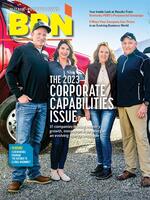
Fifty years ago, most propane dealers kept customer records on index cards and were “technologically advanced” if they had a fax machine in the office. Those company leaders who took a long-term, strategic outlook and were purposeful in their planning, hiring and investment are responsible for creating today’s successful companies. What will tomorrow’s success stories look like?
In the rapidly changing business environment in which we are all operating, it is crucial for propane companies to not only adapt to the current market conditions but to also prepare for the future. Building a business that will be viable and successful for many years to come involves strategic planning, innovation and a strong focus on resiliency. At the same time, a company must also strive to arrive at that future by staying relevant, competitive and adaptable. How can a propane business leader focus their energy and attention on building a company that will thrive in the future?
1. Embrace Innovation & Technological Advancements
One of the fundamental aspects of building a future-ready company is to embrace the evolving technology landscape.
The pace of technological change has accelerated dramatically, and businesses that fail to keep up with these advancements risk being left behind. By fostering a culture of innovation within the organization, companies can stay ahead of the curve and continuously improve their products, services and processes.
Even if they are not directly conducting research and development, companies should allocate resources to explore new technologies, trends and emerging markets.
By leveraging the power of technology, businesses can improve operational efficiency, enhance customer experience and develop innovative solutions that meet the evolving needs of their target markets.
2. Develop Agile & Adaptable Organizational Structures
Flexibility and adaptability are essential qualities for a company aiming to build a future-ready organization.
One way to foster agility is by implementing a flat organizational structure that promotes collaboration, cross-functional teams and decentralized decision-making. This allows for faster communication, increased innovation and more efficient problem-solving. Additionally, companies should support a learning culture where employees are encouraged to continuously develop their skills and adapt to new challenges.
Embracing digital transformation can also enhance a company’s agility. By leveraging technologies such as cloud computing, data analytics and artificial intelligence, businesses can streamline processes, automate repetitive tasks and gain valuable insights. This digital agility enables companies to stay ahead of competitors and seize emerging opportunities.
3. Develop a Culture of Learning & Development
Employees will continue to be a company’s most valuable asset. To prepare them for the future in a knowledge-based economy, a business must invest in their growth and development, building a skilled and adaptable workforce that can navigate the challenges they will face.
Organizations should encourage employees to acquire new skills, whether through formal training programs, mentorship/apprenticeship opportunities or online learning platforms. Providing regular feedback and performance evaluations can also help identify areas for growth and create a culture of continuous improvement.
Furthermore, fostering a culture that encourages innovation, individual action and creativity can attract and retain top talent at all levels of an organization. Companies should create an environment where employees feel empowered to take risks, explore new ideas and contribute to the company’s success. Offering competitive compensation packages, providing opportunities for career advancement and promoting work-life balance are also important factors in attracting and retaining the kind of employees who can take your company into the future.
4. Foster a Customer-Centric Approach
Building a company for the future requires a strong focus on understanding and meeting the needs of customers. Customer preferences and expectations are constantly evolving, and businesses must be proactive in anticipating and addressing changes. By adopting a customer-centric approach, companies can build stronger relationships, enhance customer loyalty and differentiate themselves from competitors.
To build a customer-centric culture, companies should invest in gathering customer feedback and conducting market research to gain insights into customer preferences, pain points and emerging trends. This information can be used to tailor products, services and marketing strategies to better meet customer expectations.
Nobody can accurately predict what the future holds. But by adopting these best practices, propane company leaders can give the next generation of their organizations the opportunity to be competitive, successful and profitable.


